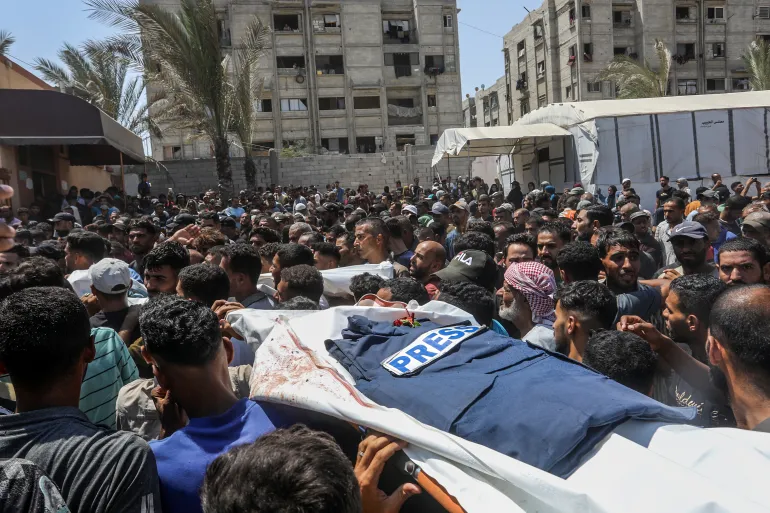Safia Ramzan
The world’s largest association of genocide experts has made a historic and damning declaration: Israel is committing genocide in Gaza. In a three-page resolution, the International Association of Genocide Scholars (IAGS) has concluded that Israel’s actions meet the precise legal definition of genocide as set out in the 1948 United Nations Convention. The resolution, supported by 86% of those voting, catalogues widespread destruction, systematic targeting of civilians, and policies aimed at erasing Gaza’s ability to survive and regenerate as a community. It is the most authoritative indictment yet of Israel’s ongoing war.
The IAGS is not a fringe group. With over 500 members worldwide, it is the leading professional body of genocide scholars, including many Holocaust experts. Their judgment carries weight precisely because it emerges from a community deeply familiar with the Holocaust — the event that gave birth to the very concept of genocide. For Israel, a state founded in the aftermath of Nazi atrocities, such a verdict is both symbolically devastating and legally profound.
The resolution is unambiguous. It cites Israel’s near-total destruction of Gaza’s housing stock, systematic bombing of hospitals, schools, and aid convoys, and deliberate restriction of food and medicine. It highlights statements from Israeli leaders promising to “flatten Gaza” and turn it into “hell,” language that dehumanises Palestinians and signals intent to destroy a population. Perhaps most damning is the reference to UNICEF reports that over 50,000 children have been killed or injured in just 22 months — a number so staggering it reshapes the demographic future of Palestinians in Gaza.
Israel has rejected the IAGS findings outright. Its Foreign Ministry dismissed the resolution as “an embarrassment to the legal profession,” claiming it was based on “Hamas lies.” Officials argued that Israel is the true victim of genocide and framed the accusations as part of a wider campaign of delegitimisation. Yet such responses do little to address the core evidence: entire communities reduced to rubble, widespread starvation, and policies that target the collective survival of Palestinians rather than military objectives alone.
International law is clear. The UN Genocide Convention defines genocide as acts intended “to destroy, in whole or in part, a national, ethnical, racial or religious group.” By this measure, the systematic killing of tens of thousands, the destruction of homes and infrastructure essential to survival, and the prevention of births or regeneration all constitute genocidal acts. The IAGS insists that Israel’s war has moved beyond combat with Hamas into collective punishment of Gaza’s entire population. Even while acknowledging the October 7 Hamas attack — in which 1,200 were killed and 251 taken hostage — as a crime, the scholars argue Israel’s response has been indiscriminate and disproportionate, targeting civilians on a mass scale.
Numbers alone tell a story of catastrophe. Gaza’s Hamas-run Ministry of Health reports 63,557 killed and 160,660 injured. The figures, considered broadly credible by international agencies, show a population under siege. Meanwhile, the UN-backed Integrated Food Security Phase Classification (IPC) has confirmed famine in parts of Gaza. Starvation, international law insists, cannot be used as a weapon of war. Yet Israel’s tight control over border crossings, aid convoys, and fuel supplies has created precisely that outcome.
The ICJ, the UN’s top court, is already considering a genocide case brought by South Africa. Though Israel has been granted an extension until January 2026 to present its defence, the case has set global precedent. Israel has accused South Africa of antisemitic motivations and likened the case to historic “blood libels.” Yet the ICJ’s willingness to hear the case demonstrates that the charge of genocide is no longer confined to activist rhetoric — it is now under judicial review at the highest level. The IAGS resolution, though not legally binding, strengthens the argument and adds intellectual legitimacy to the case.
Israel’s defenders argue that its campaign is one of self-defence, aimed at dismantling Hamas’s military infrastructure. Yet the scale of destruction — from schools and hospitals to refugee camps and water facilities — suggests something beyond military necessity. Rights groups, including two Israeli organisations, now openly speak of genocide. The insistence on framing all Gazans as enemies erodes the distinction between combatant and civilian, a core principle of international law.
The IAGS decision also exposes a double standard in global politics. Western governments continue to hedge, claiming only a court can determine genocide, even as their own laws recognise scholarly expertise in shaping genocide prevention policies elsewhere. The refusal to call genocide by its name reflects political alliances, particularly the West’s unwavering military and diplomatic support for Israel. Meanwhile, for Gazans, this caution translates into continued suffering, starvation, and mass death.
The Gaza war is not just another conflict. It is a moral test for the international community. The Holocaust — invoked endlessly to justify Israel’s creation — gave birth to the very word genocide. For scholars of that field to now declare that Israel is perpetrating it reveals a tragic irony. History’s survivors have become perpetrators in the eyes of history’s guardians.
The IAGS resolution is a turning point. It places the Gaza crisis within the same legal and moral framework as Rwanda, Bosnia, and Darfur. It demands accountability not just from Israel but from those governments that enable its campaign. To deny the charge of genocide now is to deny the credibility of scholarship, the suffering of victims, and the very lessons of history itself.
















